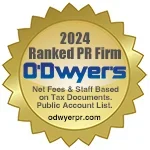 Curtis Sparrer Curtis Sparrer |
I recently took part in an interview and student Q&A session with USC’s Annenberg School for Communication and Journalism. The purpose of the talk was to share my experiences and offer some career guidance for those just starting out in PR.
The biggest takeaway that I wanted to leave is that “good PR starts at home.” If one is serious about a career in communications, good PR starts with generating PR for yourself—and I think this was the most important concept I passed along to those students on that day. Tasteful self-promotion can integrate a number of elements that can be broadly applied to any number of areas in one’s career. I’d like to share here some key concepts and approaches around being proactive and effective at personal PR.
Become an author
A good first step in doing one’s own PR is to become an author. Whether you’re writing blogs for the company or agency that employs you, placing op-eds or posting on platforms like LinkedIn or Medium, original writing gets you noticed. A well-written piece on almost any topic will illustrate your skills and expertise to clients and potential colleagues, demonstrating that you have the chops to get the job done. And it has the potential to get you media attention.
| This article is featured in O'Dwyer's May '22 PR Firm Rankings Magazine (view PDF version) |
For example, I wrote a piece on crisis management and some years later ended up being interviewed as a crisis management expert by the LA Times. Creating this blog post was rewarded with long-term ROI, and my quote in that newspaper not only positioned me favorably with clients, but it also positioned me favorably within the PR industry. What’s more, being a prolific writer means that you’ll appear more often in search results. That favorable online visibility is nearly indefinite because your writing will remain on the Internet long after you’ve first published.
Be proactive
Another key element of good PR for yourself is being proactive. Often, I think about the notion of “always be pitching.” That applies to looking for a job, and I pay the most attention to candidates who find a way to say, “Hey, I’d really like to work for you.” They usually cite something like an interesting blog post or byline or other fabulous content from my company’s website. This shows that they have been paying attention to me and my company’s work.
After you’re hired, it pays to remain proactive. My greatest confidence in an employee is when they are regularly alerting the senior team and me to potential issues at the start of the day. This could be something like a pending news story, a possible client relations issue or an internal problem, to which I need to be aware. Because that person is demonstrating presence and awareness, they’re showing me that they have some “fire in the belly” and possess career ambition. Someone who’s plugged in, has news alerts on their phone and remains proactive are the ones who have initiative and ultimately become star employees.
Talk your client’s talk
Being proactive doesn’t just apply to your own internal job; it also works very effectively as a client relations tool. In addition to working with PR and communications teams, one of the most important things in PR is being able to talk to your client’s sales organization, as well as being able to talk effectively with the CEO and other executives. This means framing campaign ideas and tactics around having a sales-centric CTA or “call to action.” Building a story or a narrative that draws people to a website and/or gets them to download a marketing or sales asset helps to drive sales. This speaks directly to ROI around communications programs—a key management concern—and demonstrates to your client that you have the client’s best interests in mind.
Boost those online meeting skills
As a leader in remote work, my firm has deep experience in what it takes to be effective virtually. I’ve developed some techniques to make my online meetings more interesting and engaging, and I like to think of doing so as another form of self-promotion and “personal PR.”
Zoom fatigue is a real thing, and with online meetings, one can easily imagine that your audience is bored. Because we’re working in a 2D and not a 3D world, there are many more opportunities for them to be distracted. After all, you’re just a window on their screen—and as such, you need to be interesting, you need to be compelling and you need to discover that overdramatic kid inside of you—the one who will break through the online clutter.
Doing so requires a proactive effort to be memorable, engaging and perhaps sometimes even outrageous. Using techniques like a rotating host/presenter, quizzes or asking people to share anecdotes or personal interests are good starters. In one case my firm employed drag queens to host a bingo game for meeting participants! It was outrageous, it was fun and it worked. By getting people to engage, you’re helping to ensure that you grab and keep their attention, establishing a better position from which to connect. This is another sort of self-PR that helps to get your message across—and clients and peers remember the online meetings I host!
One of the most compelling aspects of the PR profession is the idea that we’re all constantly trying to improve ourselves. And the idea of “good PR starts at home” fits in with a larger strategy of savvy career development and becoming a better professional.
***
Curtis Sparrer is co-Founder and Principal at Bospar.


 The NBA, which promotes legalized gambling 24/7, seems more than hypocritical for banning player for placing bets... Diocese of Brooklyn promises to issue press release the next time one of its priests is charged with sexual abuse... Truth Social aspires to be one of Donald Trump's iconic American brands, just like Trump University or Trump Steaks or Trump Ice Cubes.
The NBA, which promotes legalized gambling 24/7, seems more than hypocritical for banning player for placing bets... Diocese of Brooklyn promises to issue press release the next time one of its priests is charged with sexual abuse... Truth Social aspires to be one of Donald Trump's iconic American brands, just like Trump University or Trump Steaks or Trump Ice Cubes. Publicis Groupe CEO Arthur Sadoun puts competition on notice... Macy's throws in the towel as it appoints two directors nominated by its unwanted suitor... The Profile in Wimpery Award goes to the Ford Presidential Foundation for stiffing American hero and former Wyoming Congresswoman Liz Cheney.
Publicis Groupe CEO Arthur Sadoun puts competition on notice... Macy's throws in the towel as it appoints two directors nominated by its unwanted suitor... The Profile in Wimpery Award goes to the Ford Presidential Foundation for stiffing American hero and former Wyoming Congresswoman Liz Cheney. JPMorgan Chase chief Jamie Dimon's "letter to shareholders" is a must-read for PR people and others interested in fixing America and living up to its potential... Get ready for the PPE shortage when the next pandemic hits... Nixing Netanyahu. Gaza carnage turns US opinion against Israel's prime minister.
JPMorgan Chase chief Jamie Dimon's "letter to shareholders" is a must-read for PR people and others interested in fixing America and living up to its potential... Get ready for the PPE shortage when the next pandemic hits... Nixing Netanyahu. Gaza carnage turns US opinion against Israel's prime minister. Trump Media & Technology Group sees Elon Musk's X as an option for those who want the free expression promised by Truth Social but without Donald Trump, owner of 57.3 percent of TMTG... Chalk one up for "anti-woke warrior" governor Greg Abbott as University of Texas lays off 60 DEI-related staffers... Five percent of Americans see the US as its own worst enemy, according to Gallup.
Trump Media & Technology Group sees Elon Musk's X as an option for those who want the free expression promised by Truth Social but without Donald Trump, owner of 57.3 percent of TMTG... Chalk one up for "anti-woke warrior" governor Greg Abbott as University of Texas lays off 60 DEI-related staffers... Five percent of Americans see the US as its own worst enemy, according to Gallup. Nine of the Top 100 firms that participated in O'Dwyer's rankings last year apparently threw in the towel for the 2024 scorecard. Seven other firms also went AWOL.
Nine of the Top 100 firms that participated in O'Dwyer's rankings last year apparently threw in the towel for the 2024 scorecard. Seven other firms also went AWOL.


 Have a comment? Send it to
Have a comment? Send it to 
No comments have been submitted for this story yet.